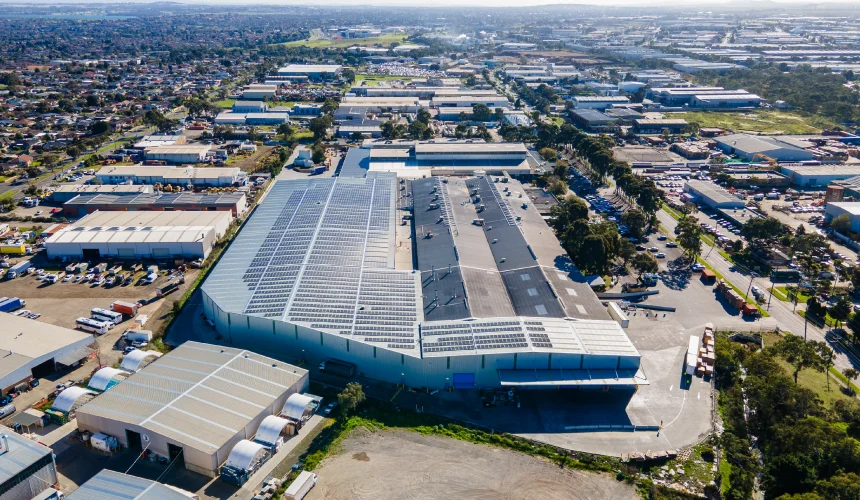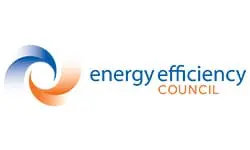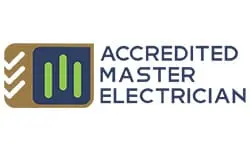In this article, we’ll cover some of the most common questions about ground-mount solar systems so you can be more informed about this solar option and decide if it’s right for your business.
And remember, feel free to contact the KUGA team anytime for more information and to discuss how we can help you harness solar power and save money in your business.
What is a ground-mount solar system?
As the name suggests, a ground-mount solar system has solar panels installed on frames anchored into the ground rather than on an existing structure or rooftop. The metal framing used is designed to support panels in an angled position that maximises their exposure to sunlight throughout the day.
Ground-mount solar systems can also be installed with a tracking system that moves the angle and position of the panels to always face the sun as it travels overhead. With a tracking-enabled ground-mount system, the panels can operate at maximum efficiency and generate as much power as possible.
What is the benefit of ground-mounted solar?
Ground-mounted solar offers several benefits:
- Flexibility in Location and Orientation: They can be installed in open areas with optimal sun exposure. This means you can avoid shade from buildings or tall trees that might limit panel effectiveness on a rooftop.
- Ease of Maintenance and Cleaning: Being accessible at ground level makes maintenance and cleaning easier. No need to climb onto a roof or use special access equipment.
- No Roof Limitations: Suitable for properties where roof mounting is not feasible due to roof condition, orientation, or shading issues.
- Adjustable Angles: Some ground mounts can be adjusted seasonally to capture more sunlight. Alternatively, they can be installed with a tracking system that does this automatically.
How is a ground-mount solar system installed?
Installation involves several key steps:
- Site Assessment: Evaluating the location for sunlight exposure, shading, and space.
- Permitting: Acquiring necessary permits and approvals.
- Preparation of the Site: Clearing the area, levelling the ground, and setting up the foundation. This involves drilling holes for the framing and trenching to accommodate cable runs.
- Mounting the Structure: Erecting the metal frames that will hold the solar panels.
- Installing Panels and Electrical Systems: Mounting the panels onto the structure and connecting them to the electrical grid.
Is ground-mounted solar cheaper?
When compared with rooftop solar, ground-mounted solar often has a higher upfront cost due to the additional need for framing and land preparation. However, ground-mounted solar is usually a more economical long-term option. This is because the higher efficiency of ground-mount systems (especially those with tracking) means they generate a higher volume of power in a shorter amount of time, helping you to recover your investment in the form of lower energy expenditure in your business.
What kind of ongoing maintenance does a ground-mounted solar system require?
Ground-mounted systems require:
- Regular Cleaning: To ensure panels are free from dust, dirt, and debris.
- Vegetation Management: Keeping the area around the panels clear to avoid shading.
- System Inspections: Regular checks for any damage or wear to the panels or supporting structure.
- Monitoring Performance: Ensuring the system operates at peak efficiency.
How far apart should ground-mounted solar panels be?
The spacing between panels is crucial to avoid shading. This distance varies based on geographic location and panel tilt. Still, generally, panels should be spaced at a distance equal to the height of the panels to prevent shading during winter months when the sun is lower in the sky.
Do you need a fence around solar panels?
While a fence may not always be required, fencing is advisable for several reasons:
- Security: To prevent theft or vandalism.
- Safety: To restrict access and reduce the risk of accidents.
- Animal Protection: To prevent damage from wildlife or livestock.
Are there government rebates for ground-mount solar systems?
While there aren’t any business solar rebates specifically for ground-mount solar systems, your business is still eligible to claim STCs (small-scale generation certificates), LGCs (large-scale generation certificates), or Solar VEECs (Victorian energy efficiency certificates) if you’re in Victoria.
These certificates are generated based on the power your solar system generates (or by how many greenhouse gas emissions it offsets in the case of Solar VEECs). You can register and trade these certificates with energy retailers who pay you their market value so they can use them to meet their emissions reduction targets.
At KUGA Electrical, we can give you an upfront discount on your ground-mount solar system based on the estimated value of the certificates your system will generate. Essentially, we give you a big discount on your solar system in exchange for the right to register and trade the certificates in your stead.
Learn more about how renewable energy certificates work.
What’s the difference between a ground-mounted solar system and a solar farm?
A ground-mounted system typically refers to a smaller-scale installation designed for individual or commercial use. In contrast, a solar farm is a large-scale solar installation designed to generate electricity on a massive scale, often for feeding into the national grid.
What are the disadvantages of ground-mount solar systems?
Disadvantages include:
- Land Requirement: They require significant land space.
- Initial Cost: Higher upfront costs compared to rooftop systems.
- Permitting and Regulation: Often subject to more stringent zoning and permitting processes.
Despite these disadvantages when compared to rooftop solar, ground-mount systems remain the most efficient solar option for businesses that want to generate the maximum amount of solar energy and increase their energy independence.
Is ground-mount solar worth it?
If you have a suitable area of land on your business and can afford the initial expense, ground-mount solar is absolutely worth it as a long-term investment in your company’s financial and environmental sustainability.
Check out our guide to choosing an optimal ground-mount solar system.
How do I know if ground-mount solar is right for my business?
To determine if ground-mount solar is suitable:
- Evaluate Energy Needs: Assess your business’s energy consumption and goals.
- Consider Land Availability: Ensure you have adequate land for installation.
- Analyse Financial Viability: Consider costs, potential savings, and available incentives like solar rebates and discounts.
- Consult with Experts: Seek advice from solar energy professionals like KUGA Electrical for a tailored assessment.
At KUGA Electrical, our award-winning team are ranked among Australia’s top commercial solar installers due to our dedication to helping our clients save money with expertly designed, reliable, and highly efficient solar systems. When you work with KUGA, you’ll get a thorough appraisal of your energy situation and an honest evaluation of whether ground-mount solar is right for your business.
Learn more about our services for ground-mount solar systems. Get a FREE commercial solar feasibility report so we can assess your suitability for ground-mounted solar.
















 Get Quote
Get Quote Call Now
Call Now